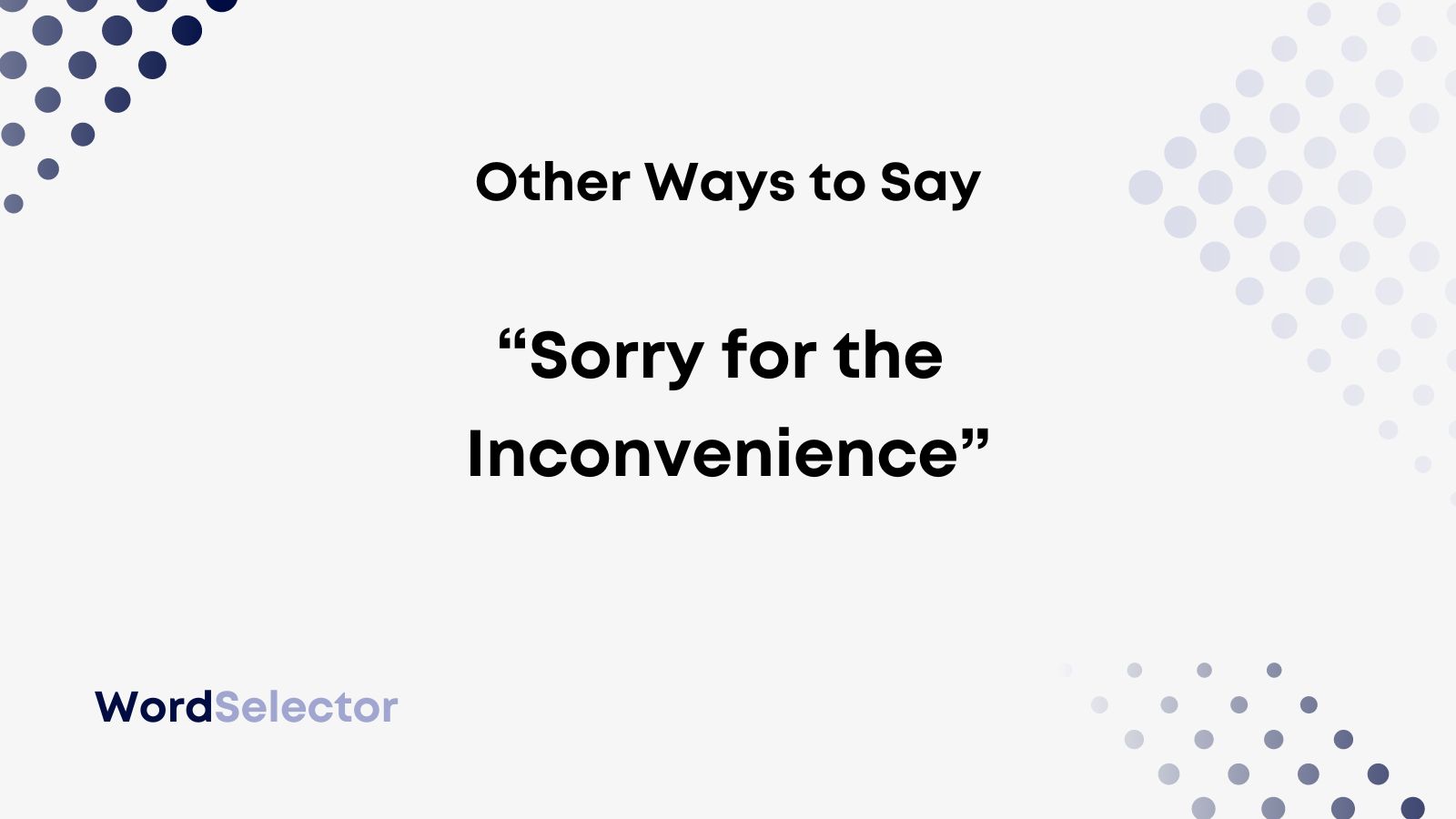Are you worried that “sorry for the inconvenience” is overused or impolite?
Or maybe you’d prefer a synonym that shows you how to say sorry for the inconvenience without saying sorry at all.
This article will explain how to apologize in a professional way. There are plenty of great options available.
Other Ways to Say “Sorry for the Inconvenience”
- Please forgive me for any issues this may cause
- I hope this isn’t too much to ask
- Sorry about all this
- Sorry for any problems this may cause
- I hope you’re not too busy to deal with this
- I apologize for all the inconvenience
- Please let me know if it’s too much
- I hope this isn’t too much to ask
- Sorry to inconvenience you
- I know you’re busy, but
KEY TAKEAWAYS
- “Sorry for the inconvenience” is one of the most common professional phrases in emails.
- “Please forgive me for any issues this may cause” is a great alternative allowing you to say sorry in a formal way.
- You can say “I hope this isn’t too much to ask” in informal situations.
You should keep reading to learn about another way to say “sorry for the inconvenience.” We have explained the best options in formal and informal contexts.
Or maybe the final section is more what you’re looking for. You can learn whether “sorry for the inconvenience” is acceptable if you skip to the final part.
Please Forgive Me for Any Issues This May Cause (Formal)
“Please forgive me for any issues this may cause” is a great choice for a formal alternative.
You should use it in professional emails when you want to take responsibility for any errors. It is a much more honest way to apologize.
You might want to use it when emailing clients. It shows that you take full responsibility for any issues arising between your company and the client. That way, you can show that you’re doing everything possible to fix the issues. This shows you’re on the client’s side.
We generally recommend using this phrase and “sorry for the inconvenience” in similar circumstances. Both are useful in business settings.
However, “please forgive me for any issues this may cause” is a bit more personal and polite. Therefore, it might be more effective than “sorry for the inconvenience” (which some deem as impersonal).
Here is an example to help you:
Dear Mrs. Turner,
I know this isn’t ideal, but we have to work with the new changes. Please forgive me for any issues this may cause.
All the best,
Jackson Merit
I Hope This Isn’t Too Much to Ask (Informal)
“I hope this isn’t too much to ask” is a great informal way to say “sorry for the inconvenience.” You can use it in friendly situations since it shows that you might need someone to inconvenience themselves to help you.
It works well when emailing colleagues to ask for help. If you worry that your request might interfere with their busy schedule, it’s wise to start your email with “I hope this isn’t too much to ask.” Then, it shows that you apologize for any issues that might come from it, but you could really use their help.
We don’t encourage using “I hope this isn’t too much to ask” over “sorry for the inconvenience” in professional settings. While it’s a very effective phrase in certain contexts, it’s not all that useful when you need to be formal.
Here are some examples to help you:
Hey Mary,
I hope this isn’t too much to ask, but I need you to wait a little longer before receiving your package.
Yours,
Danny
I hope this isn’t too much to ask, Beckett. I’m still trying to gather a group together, and I need your input on who to bring along.
Is It OK to Say “Sorry for the Inconvenience”?
“Sorry for the inconvenience” is acceptable in professional contexts. It is a very common phrase used when you might have upset someone or made them wait longer than intended.
You can use it in emails because it is a polite way to apologize. It is not rude, so you do not have to worry about your tone appearing insincere.
Also, you can use the following variations:
- Apologies for the inconvenience
- We apologize for the inconvenience
These are both formal and acceptable. You should use them when you want to mix up your writing slightly.
Some might say that “sorry for the inconvenience” doesn’t take the blame for the problems caused. So, if you want to put the blame on yourself, you can use one of the following variations:
- We are sorry for the inconvenience this caused
- I am sorry for the inconvenience I may have caused
- Thank you, and sorry for the inconvenience caused
These variations generally allow you to take responsibility. They show that you messed something up and would like to apologize for making someone wait.
Don’t forget to bookmark this page to remind yourself of the best synonyms for “sorry for the inconvenience.” Then, you will have plenty of options for when you need to write an apology email to a customer.

